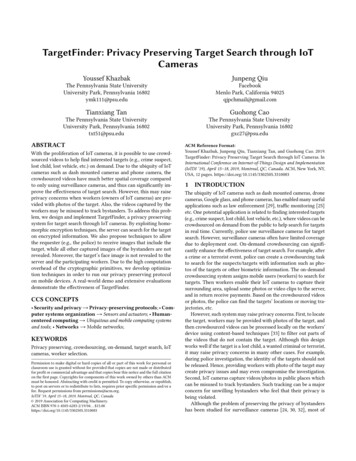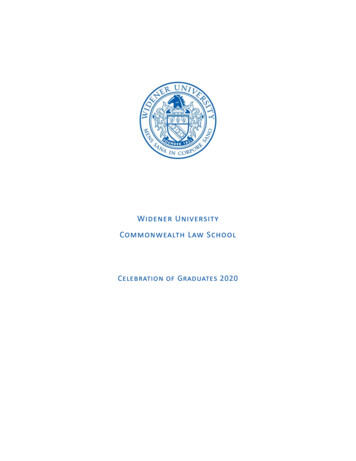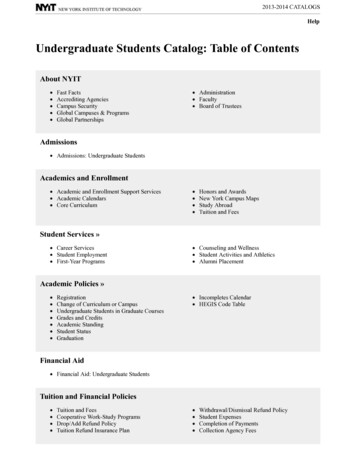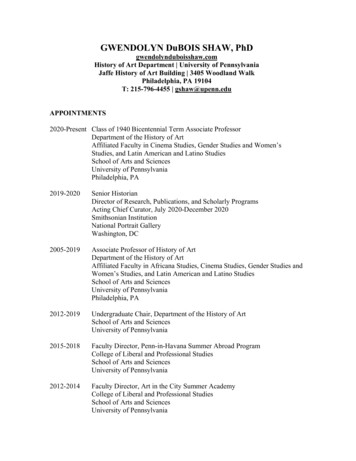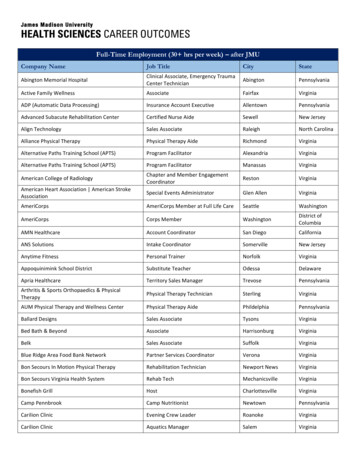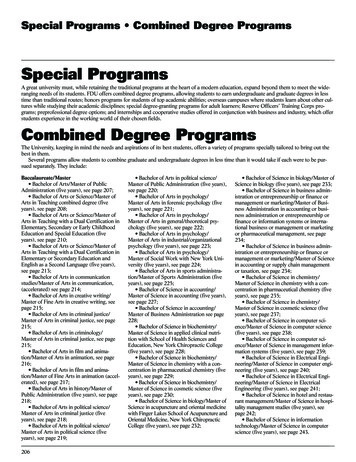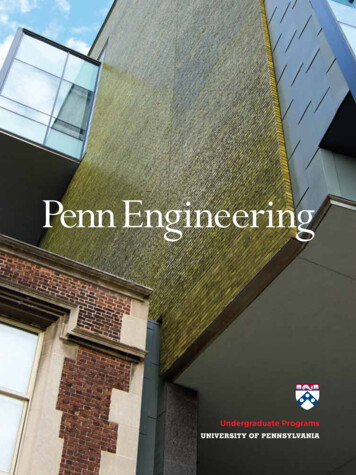
Transcription
Undergraduate Programsuniversity of pennsylvania
a pioneer in interdisciplinary ed ucationWhyPennEngineering?With the pace of innovation and technological advancementaccelerating ever faster, engineers hold the keys to the nextgeneration’s routine wonders.Today’s undergraduates grew up with the Internet. To them, searchengines, social media, nanotechnology and genetic engineeringare all familiar — even everyday. The University of Pennsylvania’sSchool of Engineering and Applied Science is uniquely positionedto propel those future intellectual leaders, entrepreneurs, thinkersand innovators to success.As an Ivy League institution — and the first university in the nation— Penn ensures its engineering and applied science students atransformative experience in the classroom and laboratory and afully rounded liberal arts education.Penn Engineering is a pioneer in interdisciplinary education, allowingstudents the flexibility to craft a program that suits their individualinterests, career or graduate education plans. Both Bachelor ofScience in Engineering (BSE) and Bachelor of Applied Science (BAS)degrees are offered, along with specialized dual-degree programs,an array of majors and minors, special programs and study-abroadopportunities.Penn Engineering students get valuable and extensive hands-onexperience, conducting research and pursuing creative designs andnew products alongside faculty renowned in their fields. The workingrelationship with faculty pervades Penn Engineering, where full-timefaculty teach all core undergraduate courses and each studenthas a faculty advisor.As the global marketplace for technology grows, graduates go onto leadership roles in business, medicine, law and academia, armedwith the technical knowledge, imagination, communication skillsand understanding of the social and human context of their work,all engendered with a fervor for the future, at Penn Engineering.
Benjamin Franklin, America’s first scientist and engineer, foundedthe University and his spirit of scientific inquiry still drives thepassion for research at Penn Engineering.Undergraduates work alongside faculty renowned in their fieldsat cutting-edge, interdisciplinary research centers and institutes thatspan all Penn Engineering departments and foster collaborationswith faculty, students and postdocs in the Schools of Medicine, Artsand Sciences and Wharton Business School, just to name a few. Penn’sresearch centers and institutes in fields including biotechnology,robotics, computer animation and nanotechnology are at theforefront of research on each scientific and technological frontier.To enhance students’research experience,Penn offers a wide rangeof support services, suchas the University’s Centerfor Undergraduate Researchand Fellowships and the PennUndergraduate ResearchMentoring Program. Studentsmay also participate inresearch projects such asSUNFEST, the SummerUndergraduate Fellowshipin Sensor Technologies,and Penn Electric Racing,among others.The Rachleff ScholarsProgram offers PennEngineering undergraduatesthe opportunity to focuson research with standingfaculty and to participate ina community of peers whoshare a common interest inresearch and scholarly inquiry.Rachleff Scholars participatein a 10-week, paid SummerResearch Experience, completehonors coursework andgain real-world skills andknowledge through interaction with industrial, corporateand community partners.Capping the PennEngineering experienceis the yearlong SeniorDesign project in whichstudents design anew approach to areal-world problem.RESEARCH
MAJORSPrepares you to applyquantitative analysistechniques to understandcomplex biological systems,to design innovativebiomedical products anddevelop new drugsBIOENGINEERINGChemical and Biomolecular EngineeringThe Department of Bioengineering (BE) at Penn, renowned as a pioneerin the field, provides a solid foundation in science and engineering, exposureto a wide variety of bioengineering areas and extensive research opportunities.Penn’s Chemical and Biomolecular Engineering (CBE) program, foundedin 1893, has a proud history at the forefront of undergraduate education.Penn added the word “biomolecular” to the program’s name in 2002 toreflect the essential role that disciplines such as molecular biology, cellularmechanobiology and genetic engineering now play in the field.At the confluence of medicine and engineering, bioengineers — also knownas biomedical engineers — use principles from electrical, mechanical,chemical and materials engineering to advance knowledge and innovation inhealthcare and the biological sciences. The growing field of bioengineeringranges from its traditional applications in technical design, basic and appliedresearch, health professions and industry, particularly the medical deviceindustry, to business, investing, intellectual property law and government,including the regulation of patents and medical devices.Prepares you to analyzecomplex biological andchemical processes,understand the interactionsbetween biomolecules andchemicals and developnew processesPenn’s CBE program combines engineering principles with concepts fromchemistry, physics and biology. The program’s flexible curriculum includestheory, problem-solving techniques and experimental work. Small classesencourage professor-student interactions and the senior process designcourse utilizes the expertise of industrial colleagues from local chemicaland pharmaceutical companies.The Bachelor of Science in Engineering (BSE) degree in Bioengineering, thefully accredited flagship professional engineering degree, provides rigorouspreparation for professional practice in a great variety of engineering andtechnical fields. The Bachelor of Applied Science (BAS) degree in BiomedicalSciences presents an option for a more flexible curriculum in bioengineeringfor those with broader interests. Pre-medical students may choose eitherthe BSE or BAS degree program. Both are identical for the first two years,and students may easily change from one to the other as their career plansbecome clearer.The CBE program’s interdisciplinary approach prepares students forleadership roles in industry, academia and the public sector in a varietyof technical areas including energy storage and conversion, chemical,petro-chemical and materials processing, biotechnology, pharmaceuticalmanufacturing and environmental remediation.Bio engineer ing (BE ) BSE S a mpl e C u r r i c u lu mC h e m i ca l a n d B i o m o l e cu la r E n gi n e e ri n g ( C B E ) S a m p le C u rri cu lu mFall S pr i ngFa l l S p ri n gYEAR ONEYEAR ONECalculus ICalculus IICalculus ICalculus IIGeneral Chemistry I & LabGeneral Chemistry II & LabPrinciples of Physics IPrinciples of Physics IIPrinciples of Physics IPrinciples of Physics IIGeneral Chemistry I & LabGeneral Chemistry II & LabIntroduction to Bioengineering IIntroduction to Bioengineering IIWriting seminarIntroduction to Chemical EngineeringSocial Sciences electiveWriting seminarIntroduction to Biotechnologyor Technical electiveFree electiveCalculus IIICalculus IVBiomechanicsBiomaterialsYEAR t w oStatisticsIntroduction to ComputingMolecular Biology & LabGenetics, Cell Biology or PhysiologySocial Sciences electiveHumanities electiveYEAR twoYEAR thr eeMaterial and Energy BalancesThermodynamics of FluidsCalculus IIICalculus IVOrganic Chemistry IOrganic Chemistry IISSH elective(Social Sciences & Humanities)Engineering Computer electiveSSH electiveFree electiveEngineering PhysiologyCell EngineeringPhysical ChemistryBioengineering Lab IISystems and SignalsBiotransportBioengineering Lab ITechnical electiveFree electiveHumanities electiveYEAR fo urYEAR t h re eFluid MechanicsHeat and Mass TransportAdvanced Chemical Engineering ScienceSeparation ProcessesPhysical Chemistry ICBE electiveOrganic Chemistry, Physical Chemistryor Biotech and Genetic ChemistrySSH electiveSSH electiveFree electiveSenior DesignSenior DesignBioengineering 4xx/5xxBioengineering 4xx/5xxEngineering electiveTechnical electiveYEAR f o u rSSH/TBS elective (Social Sciences& Humanities/ Technology,Business and Society)SSH/TBS electiveIntroduction to Process DesignProcess System Design ProjectsChemical Engineering LabChemical Process ControlChemical Reactor DesignCBE electiveSSH electiveTechnical electiveTechnical electiveSSH electiveFree electiveFree ate/degrees/maj-chembio.php
Prepares you to designand engineer computersystems from hardware, tosoftware, to networking andworldwide-distributed systems,ensuring their performance,energy-efficiency,reliability and securityComputer EngineeringComputer ScienceThe pace at which computers are transforming our world is breathtaking.New ideas and new applications are changing the very fabric of ourpublic and private lives. Think robots, smartphones and tablets, videogames, wireless networks, medical devices and anti-lock brakes, to namea few. And it is computer engineers who are pivotal in translating newtechnological capabilities into new products and services for a globalhigh-tech marketplace.The infrastructure of business, government, science and even everyday socialinteraction is today dependent upon computers and digital communication.Every time we download music, post an update on social media, drive a car,trade stocks, produce a movie, perform or undergo a medical procedure,play a video game or submit an income tax return, we rely upon networksof computers that store, exchange and process information in evermoreelaborate and innovative ways.Penn’s Computer Engineering (CMPE) major is an innovative and timelydegree program, preparing students for a wide range of career opportunitiesand the kind of intellectual entrepreneurship that is fast shaping the future.In classes led by Penn Engineering’s renowned faculty from the departmentsof Computer and Information Science, Electrical and Systems Engineering,students combine study of the fundamentals of automated informationprocessing and control with rigorous engineering design and optimization,link theory with practice through hands-on experiments and design a newapproach to a real-world problem in a yearlong senior design project.Prepares you to combinefundamental computingprinciples with softwaresystems design for applicationsencompassing everythingfrom artificial intelligence,to graphics, to mobileand networked systemsA Penn Engineering degree in Computer Science (CS) provides studentswith an in-depth education in the conceptual foundations of computerscience and in complex software and hardware systems. It allows them toexplore the connections between computer science and a variety of otherdisciplines in engineering and outside. Combined with a strong educationin mathematics, sciences and the liberal arts, it prepares students to beleaders in computer science practice, to create applications for otherdisciplines or research and to pursue an array of careers, advanced degreesor personal interests at the vanguard of technological innovation.Co mputer Engineer i ng ( CMPE ) S a mpl e C u r r i c u lu mC o m p u t e r S ci e n ce ( CS ) S a m p le C u rri cu lu mFall S pr i ngFa l l S p ri n gYEAR ONEYEAR ONECalculus ICalculus IIComputer ProgrammingProgramming Languages IPrinciples of Physics I & LabPrinciples of Physics II & LabCalculus ICalculus IIIntroduction to ProgrammingPrinciples of Digital DesignPrinciples of Physics I & LabMath Foundations of Computer ScienceGeneral Chemistry Ior Introduction to Biology IPrinciples of Digital Design LabWriting SeminarPrinciples of Physics II & LabWriting seminarSSH elective (Social Sciences & Humanites)SSH electiveYEAR twoYEAR t w oCalculus IIIMath Foundations of Computer ScienceIntroduction to Computer ArchitectureProgramming Languages & Techniques IElectrical Circuits & SystemsDigital Audio BasicsElectric Circuits & Systems LabEmbedded Systems & Microcontroller LabSSH elective (Social Sciences & Humanities)SSH electiveFree electiveProgramming Languages IIDigital Organization & DesignComputer ArchitectureCIS electiveDiscrete Probability (or statistics course)Math electiveEngineering electiveTechnical electiveSSH electiveSSH electiveYEAR t h re eYEAR thr eeStatisticsSoftware Design/EngineeringProgramming Languages & Techniques IIComputer Organization & DesignCircuit-Level Design for Digital SystemsConcurrency LabLife Critical Embedded Computing LabSSH electiveSSH electiveM/NS elective (Math & Natural Sciences)Automata, Computability and ComplexityIntroduction to AlgorithmsComputing Operating SystemsCIS Project CourseNatural Science electiveTechnical electiveTechnical electiveSSH electiveFree electiveFree electiveYEAR f o u rYEAR fo urSenior Design ISenior Design IISenior Design Project ISenior Design Project IICIS electiveCIS electiveComputer Operating SystemsTechnical electiveMath electiveTechnical electiveIntroduction to Networks & ProtocolsSSH electiveEngineering electiveSSH electiveTechnical electiveTwo free electivesSSH electiveFree electiveSSH undergraduate/degrees/maj-compscience.php
Prepares you to understand,program and applytheoretical, artistic, aestheticand experiential principlesassociated with computergraphics, animationand digital media designDigital Media DesignElectrical EngineeringComputer-generated imagery is transforming communication — fromeducational software and motion picture special effects to architecturalsimulations and medical visualizations. With these new technologies comenew questions about the creation and design of virtual environments andtheir impact upon society.Today’s electrical engineers are at the vanguard of innovation across awide spectrum of products and services ranging from communicationsystems, computers and computer networks to instruments for healthcareand diagnostics.To address these questions, Penn Engineering, in collaboration with theUniversity’s Annenberg School for Communication and the School ofDesign, created the Digital Media Design (DMD) program, an elite Bachelorof Science in Engineering (BSE) degree program for a small number ofstudents. The program is designed to educate a new generation of expertsin computer graphics: people who, through their combined education inengineering, design, and communications, are prepared to be and tocollaborate effectively with technologists and artists.The curriculum gives students a foundation in three areas: computationalbasis for the creation of digital media imagery, including simulation of3D environments; informed understanding of the aesthetic aspects of digitalmedia design; and theory and research concerning viewers’ psychologicalresponses to, and uses of, visual media as well as broader socioculturaleffects. Students in the program participate in one or two summersof real-world experience in a major multimedia industry.Prepares you to developnew technologies andcreate novel devices thatuse electricity to sense,acquire, store and processinformation or transform andtransmit powerPenn’s Electrical Engineering (EE) curriculum covers all major areas ofthe field including telecommunications and networks, imaging, remotesensing, microelectronics and integrated circuits, computer engineering,image and speech processing, robotics, video coding, neural computation,self-organizing systems, electromagnetics and photonics, electronicmaterials, silicon micromechanics and nanofluidics.The program is a broad-based major that provides a rigorous grounding inthe analytical and experimental foundations of electrical engineering whileallowing students to craft an individualized program reflecting their interestsand career goals or plans for graduate study.Digital Media Desi g n ( DMD) S a mpl e C u r r i c u lu mE l e ct ri ca l E n gi n e e ri n g ( EE) S a m p l e C u rri cu lu mFall S pr i ngFa l l S p ri n gYEAR ONEYEAR ONEProgramming Languages IProgramming Languages IICalculus ICalculus IICalculus ICalculus IIPrinciples of Physics I & LabPrinciples of Physics II & LabDrawing IDrawing IIIntroduction to Computer ProgrammingElectrical Engineering (EE) area electiveWriting SeminarMath Foundations of Computer ScienceWriting seminarSSH electiveSSH elective (Social Sciences & Humanities)Intro Psychology (SSH)SSH elective (Social Sciences& Humanities elective)YEAR twoIntroduction to Computer ArchitectureIntroduction to ComputerGraphics TechniquesYEAR t w oCalculus IIIMathematics electiveElectrical Systems and Circuits IIIntroduction to Film, Form and ContextGeneral Chemistry I orGeneral Biology (with Labs)3D Computer ModelingApp of Scientific ComputingElectrical Systems and Circuits IProfessional electiveCalculus IIISSH electiveEthics (SSH elective)(Engineering/Math/Natural Science)Principles of Physics IAutomata, Computabilityand Complexity 3DPrinciples of Physics IIEE area elective (ESE)SSH electiveYEAR thr eeYEAR t h re eComputer GraphicsVisual CommunicationsIntroduction to AlgorithmsCIS electiveEngineering ProbabilityCIS electiveNatural Science electiveIntroduction to Dynamic SystemsMathematics or Natural Scienceelective (M/NS)Psychology (Perception, Learning, etc.)Info DesignTwo EE area electives (ESE)EE area elective (ESE)Free electiveSSH electiveEE specialization elective (ESE)Free electiveSSH electiveComm/FNAR elective(Communication/Fine Arts)YEAR fo urYEAR f o u rDMD Senior ProjectPhysically-Based AnimationComputer AnimationComm/FNAR electiveSenior Design Project ISenior Design Project IICIS electiveSSH electiveEE specialization elective (ESE)Professional elective (E)SSH electiveSSH electiveProfessional elective (E)Two professional electives (E/M/NS)Comm/FNAR electiveFree electiveProfessional elective (E/M/NS)Free electiveFree e/degrees/maj-electrical.php
Prepares you to engineerand analyze systems,protocols and marketsfor tomorrow’s social andtechnological networksMarket and Social Systems EngineeringMaterials Science and EngineeringNetworks — the Internet, social networks such as Facebook, and traditionalorganizational and economic networks — touch virtually every aspectof modern life from business and investments, to communication andinformation access, scientific discovery and medicine, and governmentinformation and security.Key to the explosive growth in modern technology is the development ofadvanced materials by materials science engineers and scientists. Newmaterials from nanostructured and biocompatible materials to electronicceramics and copolymers are paving the way for new fields, new ideas andnew technologies that are changing the way we live and work.To understand the Internet, to predict behavior on it and to design newcapabilities and services for it, Penn’s Singh Program on Market and SocialSystems Engineering (MKSE) considers the Internet as an assembly ofpeople and systems, interlinked by a technological network with particularstructure and properties.The world’s first course of study to fully integrate the disciplines neededto design and analyze the complex networks that are reshaping our society,the program combines computer science, systems engineering andeconomics — examining the influence of the Internet as well as the neweconomies and markets that have developed as a result.Prepares you to usefundamental scientificprinciples to synthesize,manipulate, designand characterize thestructural and functionalproperties of advancedengineering materialsPenn’s Materials Science and Engineering (MSE) program stresses coreprinciples (thermodynamics, structure, bonding and phase transformations)and areas of concentration (nanoscale materials, biomaterials, polymers,ceramics, mechanical properties and electronic materials). The programoffers students advantages seldom found in other MSE programs:the opportunity to tailor the curriculum to their own interests, guaranteedresearch experience and an excellent student-faculty ratio.Mar ket and So ci a l S y st ems E ng i neer i ng ( MKSE) S a mpl e C u r r i c u lu mM at e ri a ls S ci e n ce a n d E n gi n e e ri n g ( MSE ) S a m p le C u rri cu lu mFall S pr i ngFa l l S p ri n gYEAR ONEYEAR ONECalculus ICalculus IICalculus ICalculus IIIntroduction to Computer ProgrammingPrinciples of Physics IIGeneral Chemistry I & LabGeneral Chemistry II & LabMathematical Foundationsof Computer ScienceProgramming Languages IPrinciples of Physics IPrinciples of Physics IIMarket and Social Systems on the InternetIntroduction to EngineeringIntroduction to NanotechnologyPrinciples of Physics IWriting seminarFree electiveNetworked LifeYEAR t w oYEAR twoCalculus IIIProbabilityProgramming Languages IILinear AlgebraScalable and Cloud ComputingIntermediate MicroeconomicsIntroduction to Dynamic SystemsSSH/TBS elective (Social Sciences& Humanities/Technology,Business & Society)Humanities elective (Ethics)Depth Technical electiveStructural and BiomaterialsQuantum Physics of MaterialsIntroduction to Nanoscale FunctionalMaterialsCalculus IIINanoscale Materials LabIntroduction to Computer ProgrammingCalculus IVWriting seminarEnergetics of Macro/Nanoscale MaterialsSSH elective (Social Sciences & Humanities)YEAR t h re eYEAR thr eeSelf Assembly of Soft MaterialsStochastic Systems Analysis and SimulationOptimization of SystemsStructure of MaterialsFabrication and Characterizationof Nanostructured DevicesTheory of NetworksIntroduction to AlgorithmsAdvanced Linear AlgebraMaterials SelectionGame TheorySSH/TBS electiveEngineering electiveEngineering electiveSSH electiveTechnical electiveSSH electiveSSH electiveFree electiveDepth Technical electiveYEAR fo urYEAR f o u rAlgorithmic Game TheorySenior ProjectSenior Design Project ISenior Design Project IISenior ProjectNatural Science electivePolymers and BiomaterialsPhase TransformationsDepthTechnical electiveFree electiveEnergy Storage TechnologyEnvironmental Degradation of MaterialsTechnical electiveFree electiveTwo SSH electivesSSH electiveTechnical electivewww.mkse.upenn.eduFree aj-materialscience.php
Mechanical Engineering andApplied MechanicsPrepares you to analyze,design and manufacturecomponents and systemsinvolving machines and energyconversion systems at nano,micro and macro length scalesMechanical engineers design and develop everything we think of as amachine — from rocket engines and nano motors to toasters and powertools. As well, mechanical engineering is at the core of any energyharvesting or conversion technology.Students in Penn’s Mechanical Engineering and Applied Mechanics (MEAM)program follow a course of study that contains basic groundwork in allaspects of mechanical engineering, while flexibility in the curriculum allowsthem to pursue elective programs in fields such as aeronautics, robotics,computers, electronics, automatic controls and materials.Career opportunities for mechanical engineers are perhaps the broadestamong all the engineering specialties. Aerospace, automotive, electronics,computers, energy and robotics are but a few of the fields that employmechanical engineers. Positions range from research and development,to design and manufacturing, to field engineering and marketing.Mechanical Eng i neer i ng a nd A ppl i ed M ec ha ni c s(MEAM) Sample C u r r i c u lu mFall S pr i ngYEAR ONESystems Science and EngineeringPrepares you to design,analyze, optimize anddeploy complex, networkedtechnological systemsthat ensure efficient andsafe operationThe field of systems engineering originated at Penn in 1953. Since then,many enterprises that directly affect everyday life — computers, environmentalorganizations, manufacturing, logistics, transportation, information andtelecommunications, economic and financial networks, healthcare andmilitary defense among them — have grown evermore complex anddemanding of innovative systems to ensure their effective operation.Penn’s Systems Science and Engineering (SSE) program specializes inthose aspects of engineering that pertain to effectiveness of whole systemsand the synthesis of more complex behaviors from simpler components.In contrast to other engineering specialties, which are grounded in specificbiological or physical sciences, systems science is grounded primarily inmathematics, computation and design methodologies. The core curriculumfocuses on mathematical modeling, simulation and optimization of complexengineered systems.S y s t e m s S ci e n ce a n d E n gi n e e ri n g ( SSE ) S a m p le C u rri cu lu mFALL SPRINGYEAR ONECalculus ICalculus IIIntro to Mechanics & LabPrinciples of Physics II & LabPrinciples of Physics I & LabPrinciples of Physics II & LabCalculus ICalculus IIIntroduction to Computer ProgrammingGeneral Chemistry I & LabIntroduction to Computing (elective)Writing seminarSystems Science Engineering (SSE)area electiveSSH elective (Social Sciencesand Humanities)Introduction to Mechanical Design (elective)Writing seminarSSH elective (Social Sciences& Humanities elective)Statics and Strengths of MaterialsThermodynamics ICalculus IIIMathematics or Natural Science electiveMechanical Engineering Lab IAEngineering Mechanics: DynamicsSystems MethodologyCalculus IIIMechanical Engineering Lab IBGeneral Chemistry I orGeneral Biology (with Labs)Machine Design andManufacturing (elective)Calculus IVElectrical Systems and Circuits ISSH electiveEthics (SSH elective)Professional elective (Engineering/Math/Natural Science)YEAR twoSSH electiveYEAR t w oSSH electiveOptimization of SystemsSSH electiveYEAR thr eeYEAR t h re eFluid MechanicsHeat and Mass TransferProbabilityStatisticsVibrationsMechanics of SolidsIntroduction to Dynamic SystemsControl of SystemsMechanical Engineering Design LabMechanical Engineering Design LabEngineering EconomicsSSE area elective (ESE)SSH electiveUpper-Level MEAM CourseProfessional elective (Engineering)Professional elective (Application focus)Free electiveMath electiveSSH electiveFree electiveYEAR f o u rYEAR fo urMechanical Engineering Design ProjectsMechanical Engineering Design ProjectsSenior Design Project ISenior Design Project IIUpper-Level MEAM CourseUpper-Level MEAM CourseStochastic Systems AnalysisProfessional elective (Engineering)Professional electiveProfessional electiveSSE specialization elective (ESE)Professional elective (Application focus)SSH electiveSSH electiveProfessional elective (Application focus)SSH electiveFree electiveFree electiveFree electiveFree degrees/maj-systemscience.php
Penn Engineering’s specialized dual degree programs allow studentsto combine their BAS or BSE degree with a second degree in one ofPenn’s other undergraduate schools, pursuing an integrated curriculumjointly offered by the two schools and incorporating interdisciplinarycoursework. Students receive two degrees upon completion of thespecialized curricula. Minimum dual degree requirement: 46 course units.With technology evermore complex and the speed of technological changeevermore accelerated, engineers and scientists must be prepared tothink big picture and across disciplines. Penn Engineering’s interdisciplinaryspecial programs offer students a diverse academic experience andthe intellectual grounding essential to collaboration and innovation.The Bachelor of Science in Engineering (BSE) is Penn’s flagshipThe Jerome Fisher Program in Management and Technology(M&T) enables students to understand and integrate engineering andprogram, preparing students for careers in professional engineering,computer science or digital media design. Minimum BSE requirement:40 course units.The Bachelor of Applied Science (BAS) combines a broaderapplied science education with specialized interest in engineering andtechnology. Program options include Biomedical Science, CognitiveScience, Computational Biology, Computer Science and individualizedprograms. Minimum BAS requirement: 40 course units.specialprogramsIn addition to the minors associated with specific Penn Engineeringdepartments, these interdisciplinary minors allow students to exploretechnologies and take coursework across departments:Minor in Energy and Sustainability provides students with broadcoverage of critical technical and societal issues and in-depth treatmentof selected topics in technical areas relevant to energy and sustainability.Making Contact Withthe Right Career Opportunitiesis Easy at PennPenn Engineering’s reputationfor top students attracts topemployers, many of them Pennalumni. Close to 400 companiesrecruit annually through theOn-Campus Recruiting Service.More than 120 companies, frommulti-national conglomerates tohigh-tech companies, participatein the annual EngineeringCareer Awareness Day. Studentsalso benefit from advice oncareers and job-hunting fromthe Career Services Center.business concepts. Graduates receive a BSE or BAS from Penn Engineeringand a Bachelor of Science (BS) in Economics from the Wharton School.www.upenn.edu/fisherVagelos Integrated Program in Energy Research (VIPER)offers instruction and state-of-the-art research experience in energyscience and technology and prepares students to be innovators in thediscovery and development of sustainable approaches to harness,convert and use energy. Graduates earn both a Bachelor of Arts (BA)and a BSE degree.www.viper.upenn.eduComputer and Cognitive Science combines studies in computerscience and engineering with linguistics, mathematics, philosophy orpsychology. Graduates receive a BSE or BAS and a BA from the Collegeof Arts and Minor in Engineering Entrepreneurship gives students the skillsimportant to the creation of technology-based startups and the abilityto market ideas successfully and or.phpCareer Path
span all Penn Engineering departments and foster collaborations with faculty, students and postdocs in the Schools of Medicine, Arts and Sciences and Wharton Business School, just to name a few. Penn's research centers and institutes in fields including biotechnology, robotics, computer animation and nanotechnology are at the
